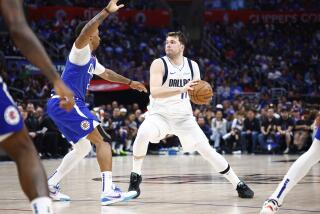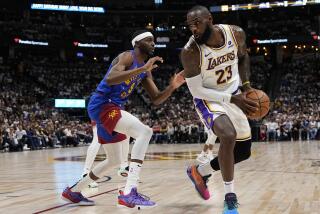Labor Pains May Be All Talk
- Share via
There they go again.
How can the NBA and its players announce they intend to make an early deal, with a contract in place that both sides agree works, and wind up fighting anyway?
The problem lies in the bad history and volatile relationship between David Stern, the most powerful commissioner in American sports, and the player agents.
For all his acumen, Stern is temperamental, doesn’t like being crossed and doesn’t forget it when he is. He has scant regard for agents, some of whom are lawyers, as he is, and are just as tenacious as he is.
With his big-ticket corporate sponsors unnerved by the NHL experience, Stern needs a quick deal. But the process slowed in recent weeks and began backing up. Sending everyone back to their corners, Stern cut off negotiations.
The league says the union reneged on agreements after the agents got involved.
From the union’s perspective, when Stern blamed the agents he was back to his old strategy of trying to divide the group, appealing to the predominantly black players to reassert control, rather than being led around by their predominantly white agents.
The league denies this, noting some key agents, such as Bill Duffy, are African American. Nevertheless, the agents believe otherwise and are seething.
Union head Billy Hunter, an African American, took it as a suggestion his predominantly black union is being run by predominantly white agents and called it “an insult.”
Labor disputes are as much about distrust as facts, and this one has enough to last for months.
Stern may well lock the players out July 1. After that, with no games being lost and no players being paid over the summer, there will be little reason to get down to real bargaining until Oct. 1, when training camps are scheduled to open.
The July 1 lockout strategy is now a standard NBA tactic. It’s an adept move by Stern to take control of the calendar, putting pressure on the players without risking the postseason.
It is a lesson he learned from the 1994 baseball strike, when Commissioner Bud Selig lost control of the calendar. The players went out late in the season, which put the pressure on the owners. When the owners stuck to a hard line, they wound up losing their all-important postseason, including the World Series.
The NBA has already had two “soft” lockouts, in 1995 and 1996. One was settled within hours, the other in 79 days, in mid-October.
Then there was 1998, the NBA’s one real labor action, when the owners had a real grievance, the players resisted, and the lockout lasted until January.
Now, in the absence of grievances on either side, wouldn’t it be nice if all the millionaires (Stern, Hunter, the agents, the owners and the players) could divide up their $2.5 billion without bothering us with their “problems”?
From a detached perspective, here’s the real deal:
* The league is entitled to a giveback.
The players are supposed to be getting anywhere from 51% to 58% of the revenue, but, in fact, came in anywhere from 58% to 68% over the last six years.
The difference in what the owners were supposed to get was made up by the players, through their 10% escrow tax, and the biggest-spending teams, in the form of a luxury tax. The taxes turned out to be the salvation of the deal, making sure players and owners actually
got their agreed-upon percentages.
The league now contends its proposal to shorten contracts to five years is only “tweaking” the deal to get costs in line.
That sounds right and until recently, it sounded right to the union too. Union sources were suggesting for months they were OK with five years.
* As far as the issues are concerned, they really are close to a deal.
The league was satisfied with five-year deals, the union was ready to sign off and there’s no reason they can’t get back to that, assuming rationality holds sway.
The 20-year age rule, which is supposed to be a sticking point, actually is not. Stern wants it but reportedly doesn’t consider it a deal-breaker if he doesn’t get it. This is all about money.
* African American, Caucasian or polka-dot, the agents really are the most militant force within the union.
This was demonstrated at the end of the 1998-99 lockout, when the membership rose up to endorse the deal Hunter worked out with Stern, with only two or three dissenting votes, over the objections of the big agents.
Things were even worse then. Hunter was new and the moving force behind his union was, indisputably, Michael Jordan’s agent, David Falk. The imperious Falk was focused on the interests of star players, was spoiling for a fight, and had packed the union’s leadership with clients like then-president Patrick Ewing, Dikembe Mutombo and Alonzo Mourning.
Falk is now a minor force. The union is led by journeyman players like the current president, Michael Curry, who has defended the 1999 deal, which took care of the low-end players, boosting minimum salaries.
No single agent rises to Falk’s prominence now. However, as a group, they’re still militant and they still constitute a political force Hunter has to accommodate.
* This is not the NHL, it just sounds like it.
The NHL labor dispute was marked by distrust between the sides, but there seemed little dispute on one overriding fact, that the industry was not profitable and owners needed a major overhaul of the system.
The NBA labor dispute has its share of distrust, but the overriding fact is the industry is profitable and is not in need of a major overhaul.
You never want to underestimate the possibility of everyone becoming emotional and messing everything up. However, if the NBA, which is still trying to reach its pre-1999 levels, has a good deal in place and just saw the NHL go down the drain, fouls this up, Stern and Hunter should resign and go into hiding.
More to Read
Go beyond the scoreboard
Get the latest on L.A.'s teams in the daily Sports Report newsletter.
You may occasionally receive promotional content from the Los Angeles Times.










